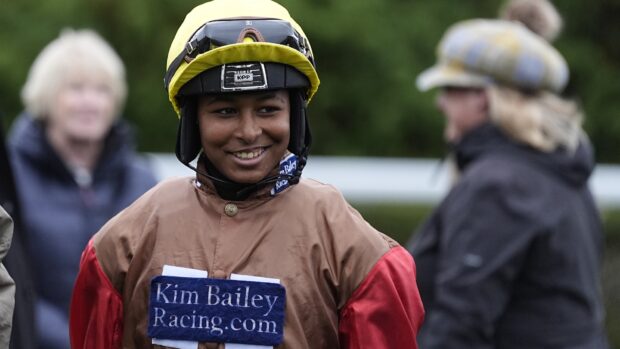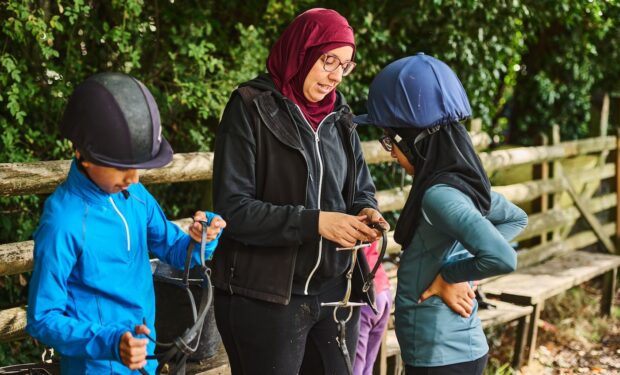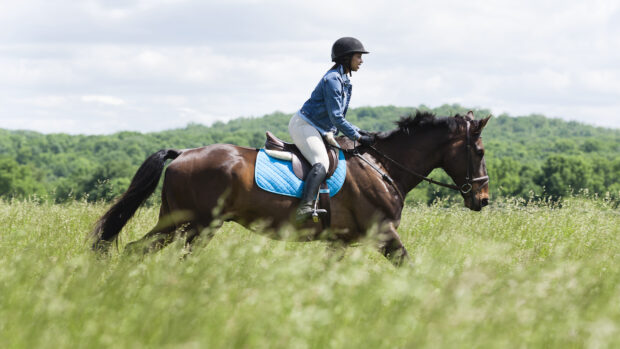Reece McCook, founder of online campaign Ride Out Racism, on promoting cohesion within the equestrian community and how he wants to stand out
When I was six, I was strolling to the local shop with my auntie and we passed a field with two Shetlands. I automatically decided I was going to call them Bobbie and Jack and wanted to feed them carrots. Since that moment, my love for horses has grown and grown.
I volunteered at my local riding school in Coventry, in return for rides. Once I fell off two horses in one day. I went home and told Mum. I had no confidence. A week later, I got an envelope addressed to me. All I did was scream! It was a picture of Carl Hester at the 2012 Olympics. It said, “Wishing you all the luck in your equestrian career, reach for the stars, best of luck, Carl.” My mum had told one of her colleagues about my loss of confidence, they had emailed Carl and that was his response.
It’s not something you see every day, a Black person riding horses. I’m from an inner-city community and I hid the fact I rode from my friends until I finished college. I felt I’d be judged. Being in the saddle, nothing else matters. The only thing I’m concentrating on is the way my horse is going, my position, my posture, I love the technicality horses bring. I love even saying I can ride. You’re as one, a team, learning non-verbal communication skills.
In every equestrian establishment I’ve been the only person of colour. My family is multi-cultural; Scottish, Barbadian, Irish and Jamaican. I’ve had some negative experiences. I was at a little DIY yard for two weeks, and I was refused a tack room key by a woman who didn’t trust me; she thought I must be a thief.
I felt judged by a stereotype. It was disheartening.
I’ve always wanted to be an event rider. I finally got my working pupil placement and it felt like gold dust. My family threw a big party, we were so excited about the opportunity. I lasted three weeks. The rider I was working for was off competing almost all the time. I was called useless ******, chimney sweeper, black jack (that’s the paint we used to paint stables).
It knocked my confidence. The yard manager said, “We’ll speak to the person.” My auntie is a policewoman and said, “You need to take it further,” but the witnesses refused to give a statement.
My dream was shattered, I didn’t think I’d ever get anywhere in the industry. I wanted to give up, but thanks to the support of my friends and family I came up with “Ride Out Racism”. I want to make changes for everyone else.
I didn’t want to come across as an angry Black man with a chip on my shoulder. I’m absolutely not saying the equestrian world is racist, that’s not my message. We want to lower the barriers and make the sport more accessible and diverse.
Continued below…

The barriers to ethnic diversity in equestrian sport – and how to pull them down
As protests around the world throw a spotlight on the underrepresentation of ethnic backgrounds in the British equestrian industry, H&H

‘Change is coming’ to improve diversity in equestrianism
‘Some people might feel uncomfortable, as they think pro-Black means anti-white, but it doesn’t’

Subscribe to Horse & Hound magazine today – and enjoy unlimited website access all year round
Ride Out Racism sells rosettes as a promotional thing. A percentage of sales goes to inner-city riding school Urban Equestrian Academy, plus commission to the sales platform Etsy, and to fund future projects. As they’re usually awarded in competition, there’s a positive connotation with achievement.
Future plans include producing a calendar featuring ethnic riders, and an education pilot working with schoolchildren in inner-city communities to deter them from anti-social behaviour and get them involved with horses.
There are inspiring stories out there. I’ve heard from the first Black physiotherapist for the equestrian industry; that was so powerful. Empathising with ethnic riders who have been through the same struggles is empowering. I know I’m not alone and I’m making a difference.
The journey to success is so rewarding; my goal is to ride at Badminton, competing with William Fox-Pitt and Oliver Townend. I want to stick out like a sore thumb. I want people to say, “I remember him, he started Ride Out Racism, now look at him.”
Ref Horse & Hound; 23 July 2020



